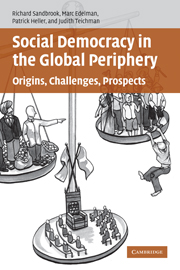Book contents
- Frontmatter
- Contents
- List of tables
- Acknowledgments
- Part I Introduction
- Part II Case studies
- 3 Kerala: Deepening a radical social democracy
- 4 Costa Rica: resilience of a classic social democracy
- 5 Mauritius: evolution of a classic social democracy
- 6 Chile: the tumultuous path to the Third Way
- Part III Patterns and prospects
- References
- Index
6 - Chile: the tumultuous path to the Third Way
Published online by Cambridge University Press: 22 September 2009
- Frontmatter
- Contents
- List of tables
- Acknowledgments
- Part I Introduction
- Part II Case studies
- 3 Kerala: Deepening a radical social democracy
- 4 Costa Rica: resilience of a classic social democracy
- 5 Mauritius: evolution of a classic social democracy
- 6 Chile: the tumultuous path to the Third Way
- Part III Patterns and prospects
- References
- Index
Summary
Of our four cases, Chile is the most difficult to classify as a regime type. In contrast to the relatively clear paths that Costa Rica, Kerala, and Mauritius have traveled, Chile's history has been discontinuous and contorted. During the radical-mobilizational period that culminated in the Allende government (1970–1973), Chile moved much further to the left than any of our cases and was arguably the most radical experiment in democratic socialism ever undertaken in the periphery. Yet, during the Pinochet dictatorship (1973–1990), not only did Chile embrace market reform with the fervor that only a highly disciplined, authoritarian regime can muster, but it did so while aggressively repressing the popular sectors. The ambiguous character of the post-Pinochet center-left Concertación (1990 to present) reflects this tumultuous history of successive class polarization and lower-class demobilization. On the one hand, Concertación governments have implemented neoliberal reforms with a consistency that has no counterpart in the region. On the other hand, class-based demands have remained central to the political process and Concertación governments have embraced the language of social democracy. Moreover, these governments have been more effective in expanding social benefits and tackling poverty than other states in Latin America (aside from Costa Rica and Cuba). Although Chile's lower classes have yet to regain the political influence they enjoyed in the Allende period, the current configuration of power does make some degree of social regulation of the market a political necessity.
- Type
- Chapter
- Information
- Social Democracy in the Global PeripheryOrigins, Challenges, Prospects, pp. 147 - 174Publisher: Cambridge University PressPrint publication year: 2007
- 1
- Cited by

